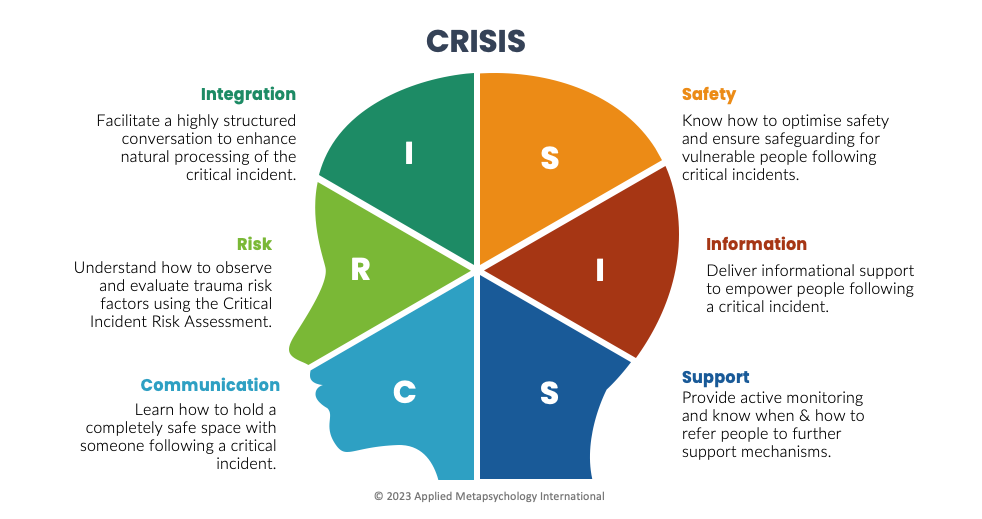Critical Incident Stress Intervention and Support (CRISIS) is a person-centred and culturally responsive system of crisis intervention for helping people through stress and trauma.
When something bad has happened to a colleague it can be difficult to know how best to support them. The moment of disclosure is so important. You need to handle it effectively.
It may have significant implications for them, and of course, your organisation.
What is the CRISIS?
CRISIS is an effective tool that can help you achieve the best possible outcomes for distressed people.
Using an entirely person-centred approach, CRISIS facilitator’s are able to create and hold a wonderfully safe space. There’s no judgement, no analysing, and no interpreting of someone’s feelings, emotions or concerns.
It’s just pure and effective support.
Definition: A critical incident is any incident that has the potential to cause a condition of crisis; a stressor; an incident that has the potential to become traumatic.
Definition: A crisis is a condition of intense psychological adversity. Crises only last as long as a person anticipates or is aware of some threat(s).
Within a crisis intervention sector focused upon the emergency services and disaster relief, the idea of what represents a critical incident has largely focused on a list of ‘usual suspects,’ such as road traffic collisions, house fires, violent crimes, air crashes, etc.
This is a simplistic approach to a far more nuanced subject, which has led to over provision of support following some incident types, and under provision when incidents haven’t been deemed worthy (or traumatic enough) to warrant the initiation of support processes.
Naturally, relying upon a list of incident types designated objectively ‘critical’ then does not provide for people who experience critical incident stress following those incidents that aren’t ‘on the list’.
The Critical Incident Risk Assessment (McCallum,2024) provides a novel view of critical incidents through the use of thematic commonalities that may be apparent in any type of critical incident.
Whatever has happened, CRISIS can help move people from reaction to response, and from disempowerment to empowerment.
Critical Incident Stress Integration and Support (CRISIS) is a psychological first aid system for helping people when they have experienced a potentially overwhelming incident/event or situation.
The psychosocial nature of CRISIS means that ordinary people can be trained as Facilitators, in order to help other people in their organisations or social groups, providing immediate and effective support.
In short, CRISIS facilitator’s provide a supportive and humane response to the emotional and psychological needs of a fellow human beings when something bad has happened to them.
CRISIS facilitator’s don’t have to be clinically trained psychologists, psychotherapists, or counsellors – they can be caring professionals, practitioners, peers or volunteers who have can demonstrate trustworthiness, discretion and non-judgmental values, and are suitably placed to support colleagues or dependents in difficult times.
CRISIS facilitator’s are equipped with a robust tool-set with which to provide an effective support system for colleagues, clients or service users in emotional or psychological distress.
CRISIS can be used by trained facilitators upon first contact with someone in distress.
Uniquely, CRISIS can be used both during and following a critical incident, and also to provide ongoing support for critical incidents that have thematic links.
By training as facilitators, your people will be able to spot the signs of traumatic reactions, and have the skills with which to provide timely and effective support.
No, CRISIS is a system of psychological first aid, and therefore considered to be non-clinical.
CRISIS is simply a way of providing a powerful and supportive conversation designed to enhance and support natural processing and recovery. Within the CRISIS system, there is no analysis, interpretation, judgment or labelling. There is no diagnostic approach.
Neither can CRISIS be considered to be a form of ‘debriefing’ – the system’s meta psychological and psychodynamic theoretical construct, application, and (therefore) outcomes are significantly different to those of psychological debriefing.
CRISIS represents an evolutionary development within the field of crisis intervention and psychological first aid.
CRISIS is useful wherever there are people!
Here are a few key areas where CRISIS is particularly useful;
- Voluntary agencies
- Business
- Social work
- Emergency services
- Post terror/disaster recovery
- Community groups
- Clinical services
- Local authorities
- Criminal justice
- Travel industry
- Manufacture
- Construction
- Chaplaincy
- Education
- Government
- Armed forces
The CRISIS workshop takes 2 days to successfully complete and become certified.
Those facilitators wishing to develop their skills to work with groups of people can then undertake the Group CRISIS workshop, which is a further 2 days of developmental learning.
For those wishing to coordinate the work of CRISIS teams there is a further option to develop to the role of CRISIS Coordinator, which requires the completion of a further 1 day workshop.



